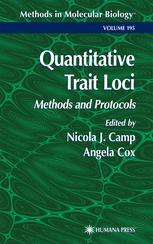

Most ebook files are in PDF format, so you can easily read them using various software such as Foxit Reader or directly on the Google Chrome browser.
Some ebook files are released by publishers in other formats such as .awz, .mobi, .epub, .fb2, etc. You may need to install specific software to read these formats on mobile/PC, such as Calibre.
Please read the tutorial at this link: https://ebookbell.com/faq
We offer FREE conversion to the popular formats you request; however, this may take some time. Therefore, right after payment, please email us, and we will try to provide the service as quickly as possible.
For some exceptional file formats or broken links (if any), please refrain from opening any disputes. Instead, email us first, and we will try to assist within a maximum of 6 hours.
EbookBell Team

5.0
48 reviewsStatistical methods for the analysis of quantitative trait locus (QTL), in conjunction with genome-wide screening technologies, are today yielding exciting results in the study of human disease, experimental organisms, and agriculture. In Quantitative Trait Loci: Methods and Protocols, Drs. Nicola Camp and Angela Cox have assembled a highly experienced panel of statistical geneticists who demonstrate in a step-by-step fashion how to use this powerful methodology and associated software for the detection and fine mapping of quantitative trait loci. Writing for the nonmathematician, these experts guide the investigator from the design stage of a project onwards, providing detailed explanations of how best to proceed with each specific analysis, to find and use appropriate software, and to interpret results. Worked examples, citations to key papers, and useful variations and/or extensions to standard methods are included that ease the reader toward understanding and successful studies. Among the cutting-edge techniques presented are QTDT methods, variance components methods, and the Markov chain Monte Carlo method for joint linkage and segregation analysis.
Up-to-date and highly practical, Quantitative Trait Loci: Methods and Protocols makes available to nonmathematical investigators a step-by-step guide to the productive use today of all the latest techniques for localizing genes involved in complex quantitative traits.